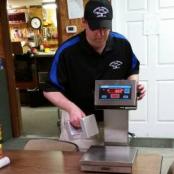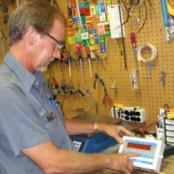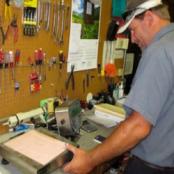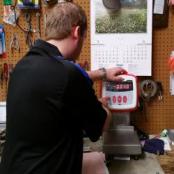Use up and down arrows to select available result. Press enter to go to selected search result. Touch devices users can use touch and swipe gestures.
We sell, repair, calibrate & rent scales
Calibration of a scale is a procedure in which a licensed scale technician uses a known cal test weight certified by the State of North Carolina Bureau of Weights and Measures, to test and adjust the response of a mechanical or electronic weighing system to the following tests; The display indicator must show zero when there is no weight on scale. When a known weight is applied the indicator must display the exact amount of applied weight within a specific tolerance. When weight is applied or removed incrementally the scale must display the weight equal to that on the scale within the specified tolerance mentioned above.
We are sometimes asked do you need a calibration weight on a scale and sometimes you might be able to get away without a weight but generally it is highly recommended that you use weights for scale calibration. The weighing scale calibration procedure is roughly the same for most scales. You make sure the scale is empty and the display shows zero. You then add a known weight and notice what the display shows. If it is in tolerance you don't have to adjust the scale. If it is out of tolerance, you need to make adjustments to bring it within tolerance. This is generally true no matter what brand you're talking about from Avery Weigh Tronix to Rice Lake. Sometimes when you are dealing with truck scale calibration it can involve a few more steps such as adjusting sections but the basic principle is the same.
We are sometimes asked how to check calibration or how often to do the testing and the answers can vary depending on your situation. To check the scale you simply put an item on the scale and see what it weighs. Ideally this would be a certified test weight. Another example might be if you own a portable truck scale, you should probably calibrate that scale every time you move it from one location to another location. Or at least check it with a known weight to make sure the accuracy is still acceptable.
One of the tremendous advantages that our scale repair and service provides you is factory training and certified scale calibration weights and weight kits. When we check your equipment it is checked with accurate weights and the accuracy is written down on our scale calibration report and we place labels on your devices which shows the date they were checked and the due date for the next service. If you are interested in learning more in depth information regarding scale tolerances we encourage you to search online for the NIST handbook 44 guide which goes into great detail about scale tolerances. In general, industrial scales are accurate to 0.1 of one percent of the test load.
 CalibrationWe have been checking, testing, adjusting, and calibrating scales since way back in 1980. Our scale technicians are certified and factory trained. And, we use certified test weights for accurate results.
CalibrationWe have been checking, testing, adjusting, and calibrating scales since way back in 1980. Our scale technicians are certified and factory trained. And, we use certified test weights for accurate results. Scale Repair ServiceScale Service and Repairs is what we do. If your Digital balance or scale breaks we can fix it. When your scale needs calibrated,we can handle that promptly & efficiently with NIST traceable standards & documentation.
Scale Repair ServiceScale Service and Repairs is what we do. If your Digital balance or scale breaks we can fix it. When your scale needs calibrated,we can handle that promptly & efficiently with NIST traceable standards & documentation.  Service - Emergency Service Emergency Scale Service is offered for customers in central North Carolina. If your Digital Balance or Scale breaks and you need it fixed in an emergency, give us a call (919) 776-7737
Service - Emergency Service Emergency Scale Service is offered for customers in central North Carolina. If your Digital Balance or Scale breaks and you need it fixed in an emergency, give us a call (919) 776-7737 Service - Repairs & TroubleshootingOur Factory Trained Technicians can repair and troubleshoot scales and since nobody in the Carolinas stocks more replacement scale parts than us, we can get you back to weighing.
Service - Repairs & TroubleshootingOur Factory Trained Technicians can repair and troubleshoot scales and since nobody in the Carolinas stocks more replacement scale parts than us, we can get you back to weighing.